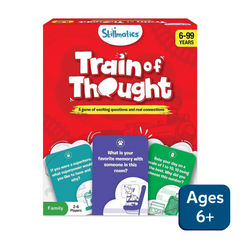Hey parents! As we navigate parenthood, let us talk about one of the most vital things that literally lies at the core of our duty as primary caregivers. Yes, we are talking about the role of moral values for kids in shaping their character and future.
No matter what style of parenting one adheres to, the value of instilling moral values in kids is non-negotiable.
These values are like a guiding compass for children that plays a pivotal role in ultimately defining the kind of individuals that they ought to become. We understand that the manner of imparting the right values to your little ones can seem overwhelming as you might be unsure of how your child will receive it. Well, we are here to apprise parents and educators on the best values to inculcate in children so that we can collectively raise socially responsible kids who are empowered and righteous enough to make a positive impact on the world.
Importance Of Moral Value In Kids' Life
Let us take a look at some benefits of teaching moral values for children:
- Moral values can serve as a guide for helping your child take the ethical ground while dealing with diverse situations and circumstances through their lives.
- One of the most valuable assets of a person is their character. By instilling moral values you can shape your child’s character that can even inspire others to become a better version of themselves.
- Children who understand the importance of moral values are likely to enjoy strong, respectful, and trustworthy relationships with family and friends. This is because, they won’t intentionally harm, deceive or humiliate someone as they would know better than to engage in such vices.
- When moral values for kids get internalised in them, they shall know the importance of self-discipline, responsibility, and accountability. This will contribute to their ability to overcome challenges in a graceful manner.
- Through moral values, children can positively influence not just their families, but society at large as well.
- By learning about the best ways to impart good values to students, you can make it possible for them to lead a fulfilled life that is rife with contentment and happiness.
7 Moral Values That You Must Teach Your Kids
We have listed seven moral values for children that will help in shaping your child’s perspective towards life and living beautifully:
This moral value forms the basis of humanity. It also fans other qualities like empathy and compassion. You can encourage your children to perform acts of kindness, such as helping a friend in need, sharing toys, or offering a comforting word to someone who is sad. You can do the same with your kid and that way, they will learn by seeing. This trait is all about making a positive difference in the lives of people you come in contact with.
When we talk about the best moral values for children, respect has to be among the topmost values as it is imperative for nurturing healthy relationships. Educate your children about the importance of treating others with dignity, irrespective of various differences. Respectful children are appreciative of diverse backgrounds and preferences of different people. This makes them capable of having harmonious interactions.
Honesty lays the foundation for integrity that fosters credibility. This trait will help your child succeed and excel in any field, as integrity is the cornerstone for success and goodwill. Make sure that you never reprimand or scare your children when they tell you the truth about any mischief. Motivate them to be truthful in their words and actions, even when faced with challenges.
Responsibility and accountability are two of the best moral values for students. You can do so by assigning age-appropriate tasks to your children and reinforcing the importance of those tasks to let them know that you trust them with important work. You can also motivate them to take ownership of their actions such as completing homework on time, caring for pets, or tidying up their room. Celebrate and reward their little achievements to develop a strong work ethic in kids.
For teaching the power of empathy, you can teach your children to show compassion to anyone who is in need. When kids pay heed to the feelings of others whenever possible, they develop emotional intelligence which is a major factor for creating an inclusive society.
Gratitude is one of the most important moral values for kids. Make it a ritual to be grateful for everything that you have. Try to foster a culture of gratitude by encouraging kids to count their blessings and writing about them in their gratitude journals. This will make them have a deep appreciation for life's little and big joys and blessings.
Forgiveness is an important moral value for children as it makes it possible for children to get rid of negative emotions, and approach situations from a positive perspective. This is an excellent characteristic for safeguarding a child’s emotional well-being and also brings peace of mind.
Ways to Instil Moral Values in Kids
There are numerous ways to teach moral values to children as they are important for their overall development and also turn them into kind and responsible individuals. Some of them are:
Children learn a lot by observing the behaviour of their caregivers. So try to demonstrate honesty, kindness and respect in your daily interactions to set a good example.
During their early years, children have an impressionable mindset. So try to share stories that highlight moral lessons to create a strong foundation for moral values, like fables, folk tales, and parables which teach honesty, integrity, and kindness.
Establish clear rules and expectations about behaviour. Consistently reinforce these rules and explain the reasons behind them.
Praise and reward children when they make good moral choices as it will encourage them to continue exhibiting their good behaviour.
Other ways such as discussing real-life situations, encouraging empathy, community involvement, educational activities etc. can effectively nurture moral values in children.
The True Meaning of Teaching Moral Values
Teaching moral values is about more than just imparting a set of rules for right and wrong; it's about nurturing the character and conscience of a child. True moral education involves helping children to develop a deep understanding of the principles that guide ethical behaviours. It aims to foster critical thinking in children and make them more mindful. By integrating moral values into everyday experiences with the right guidance and positive role models, we can help children apply these values in their everyday lives, shaping them into compassionate, responsible, and ethical adults.
As we conclude this blog on good values for students, let us recapitulate the profound impact of nurturing qualities in children. From kindness, honesty, and perseverance to sharing and integrity. When parents undertake a categorical effort to let their children assimilate these virtues, they are positively contributing to shaping the future of our society. So let's lead by example and exhibit these values in our daily lives so that our children can imbibe and embody them in a wholesome way. To that end, getting our hands on educational games such as My Quiet Book and Grocery Set from Skillmatics could also be a great way to teach some amazing foundational values to your children in a fun and interactive way.
FAQs
-
What are the 5 core moral values?
5 core moral values are:
- Responsibility
- Compassion
- Respect
- Perseverance
- Integrity
2. How do moral values shape a child's future?
Imprating good values helps children understand the perspective of others and creates a solid foundation for their decision making skills. Moral values teach them to be more kind and compassionate towards others, and lend a helping hand when needed.
3. How can parents effectively teach moral values to their children?
Having open discussions about right and wrong can help children build on their moral values. Parents can demonstrate good behaviour in everyday situations for their little ones to learn and follow in their footsteps.





